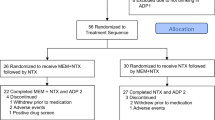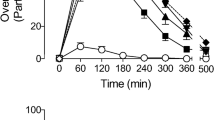Summary.
Glutamatergic NMDA receptors are believed to play a major role in the pathophysiology of numerous neuropsychiatric disorders including substance use and schizophrenia. Neuropharmacological studies measuring subjective response, psychopathology and biological parameters are helpful in studying pathophysiology of these disorders. We report preliminary data of a placebo-controlled double-blind challenge study in recently detoxified alcoholics (n = 20) and healthy controls (n = 10) using the non-competitive NMDA antagonist dextromethorphan. Findings suggest that dextrometorphan can produce ethanol-like subjective effects in both alcoholics and controls and induce a mild form of craving in alcoholics only. The results of this study give further support to the hypothesis of glutamatergic NMDA receptors mediating much of ethanol's psychotropic effects. Possible clinical implications of these findings are discussed.
Similar content being viewed by others
Author information
Authors and Affiliations
Additional information
Received June 30, 1999; accepted October 14, 1999
Rights and permissions
About this article
Cite this article
Soyka, M., Bondy, B., Eisenburg, B. et al. NMDA receptor challenge with dextromethorphan – subjective response, neuroendocrinological findings and possible clinical implications. J Neural Transm 107, 701–714 (2000). https://doi.org/10.1007/s007020070071
Issue Date:
DOI: https://doi.org/10.1007/s007020070071




